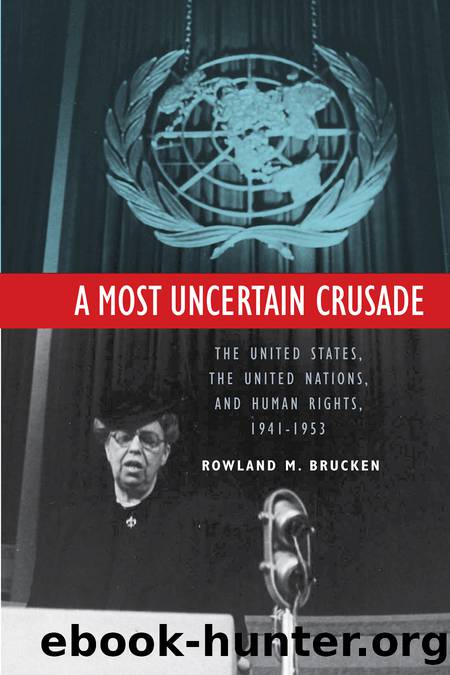A Most Uncertain Crusade by Unknown

Author:Unknown
Language: eng
Format: epub
ISBN: 9781609090913
Published: 2014-02-04T00:00:00+00:00
Chapter 6
The End of a Crusade, 1951â1953
The rising domestic and international backlash against the Genocide Convention and the human rights covenant soon forced Presidents Harry S. Truman and Dwight D. Eisenhower to change policy at the United Nations. The victorious struggle against the convention waged by conservative senators and leaders of the American Bar Association had generated the publicity, legal arguments, and political connections that they now used to attack the human rights covenant. By asserting that the covenant and other United Nations agreements could invalidate parts of the U.S. Constitution, abolish federalism by creating a centralized national government, and transport socialism to American shores, this coalition, led by Senator John Bricker (R-OH), battled for a constitutional amendment to limit the internal power of all treaties. State Department officials, growing increasingly anxious, tried to blunt such criticism by advancing proposals in the United Nations Commission on Human Rights (UNCHR) to protect statesâ rights and strike all references to economic and social guarantees. UNCHR members, though, not only rejected the American proposals, but also added an expansive article on self-
determination, attached a long list of economic guarantees, and omitted a federal-state article. Truman and Eleanor Roosevelt left office with U.S. human rights policy in shambles, a UNCHR polarized along East-West and North-South lines, and a hostile Senate on the verge of approving a constitutional amendment to repudiate their human rights proposals. It was an inglorious and bitter end for both policymakers, one who had championed American membership in the United Nations, and the other who had served for five years as the inaugural chair of the first ever global human rights commission.
To thwart passage of a constitutional amendment that he believed would cripple the presidentâs powers in foreign affairs, incoming President Dwight D. Eisenhower radically altered American human rights policy. He and Secretary of State John Foster Dulles proposed to replace the treaty-Âbased program of their predecessors with an âAction Program,â which would restrict the UNCHRâs work to educating and advising governments on human rights issues. To deflect foreign criticism of this proposal and diminish support for Brickerâs amendment, Eisenhower, Dulles, and U.N. Ambassador Henry Cabot Lodge launched a propaganda offensive at the United Nations to highlight the woeful human rights records of Communist nations. Eisenhowerâs substitute recommendations, though, met with disdain in the UNCHR. American withdrawal from the treaty-drafting process helped to create deadlock in the commission; the body would debate the covenants aimlessly for 13 more years. Another consequence would be the reluctance of future presidents to submit human rights treaties, including the Genocide Convention, for Senate consideration. Without having ratified the basic legal instruments that defined international human rights law, Washingtonâs Cold Warâtinged human rights rhetoric often sounded hypocritical, hollow, and opportunistic.
John Foster Dulles himself had traveled the trajectory from Wilsonian idealist to nationalistic Cold Warrior, and his evolution provides a window into a changing domestic political climate. His Presbyterian-infused worldview led him to fight during World War II for causes related to universal justice, a recognition of human rights, and a United Nations that had the power to enforce peace between countries.
Download
This site does not store any files on its server. We only index and link to content provided by other sites. Please contact the content providers to delete copyright contents if any and email us, we'll remove relevant links or contents immediately.
| Americas | African Americans |
| Civil War | Colonial Period |
| Immigrants | Revolution & Founding |
| State & Local |
In Cold Blood by Truman Capote(3386)
The Innovators: How a Group of Hackers, Geniuses, and Geeks Created the Digital Revolution by Walter Isaacson(3210)
Steve Jobs by Walter Isaacson(2899)
All the President's Men by Carl Bernstein & Bob Woodward(2379)
Lonely Planet New York City by Lonely Planet(2227)
And the Band Played On by Randy Shilts(2209)
The Room Where It Happened by John Bolton;(2159)
The Poisoner's Handbook by Deborah Blum(2141)
The Innovators by Walter Isaacson(2105)
The Murder of Marilyn Monroe by Jay Margolis(2099)
Lincoln by David Herbert Donald(1989)
Being George Washington by Beck Glenn(1978)
A Colony in a Nation by Chris Hayes(1935)
Under the Banner of Heaven: A Story of Violent Faith by Jon Krakauer(1807)
Amelia Earhart by Doris L. Rich(1697)
The Unsettlers by Mark Sundeen(1690)
Dirt by Bill Buford(1682)
Birdmen by Lawrence Goldstone(1669)
Zeitoun by Dave Eggers(1654)
